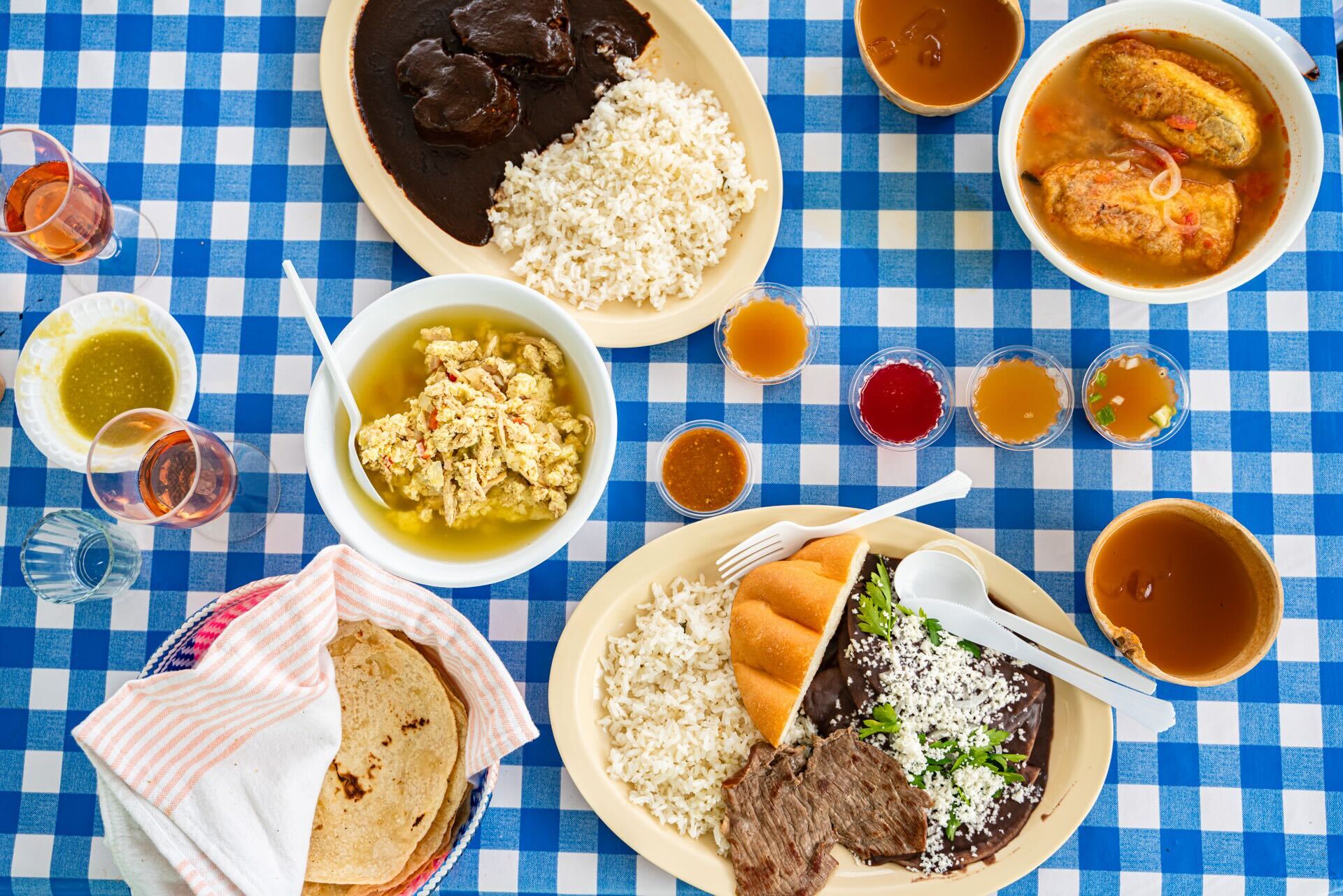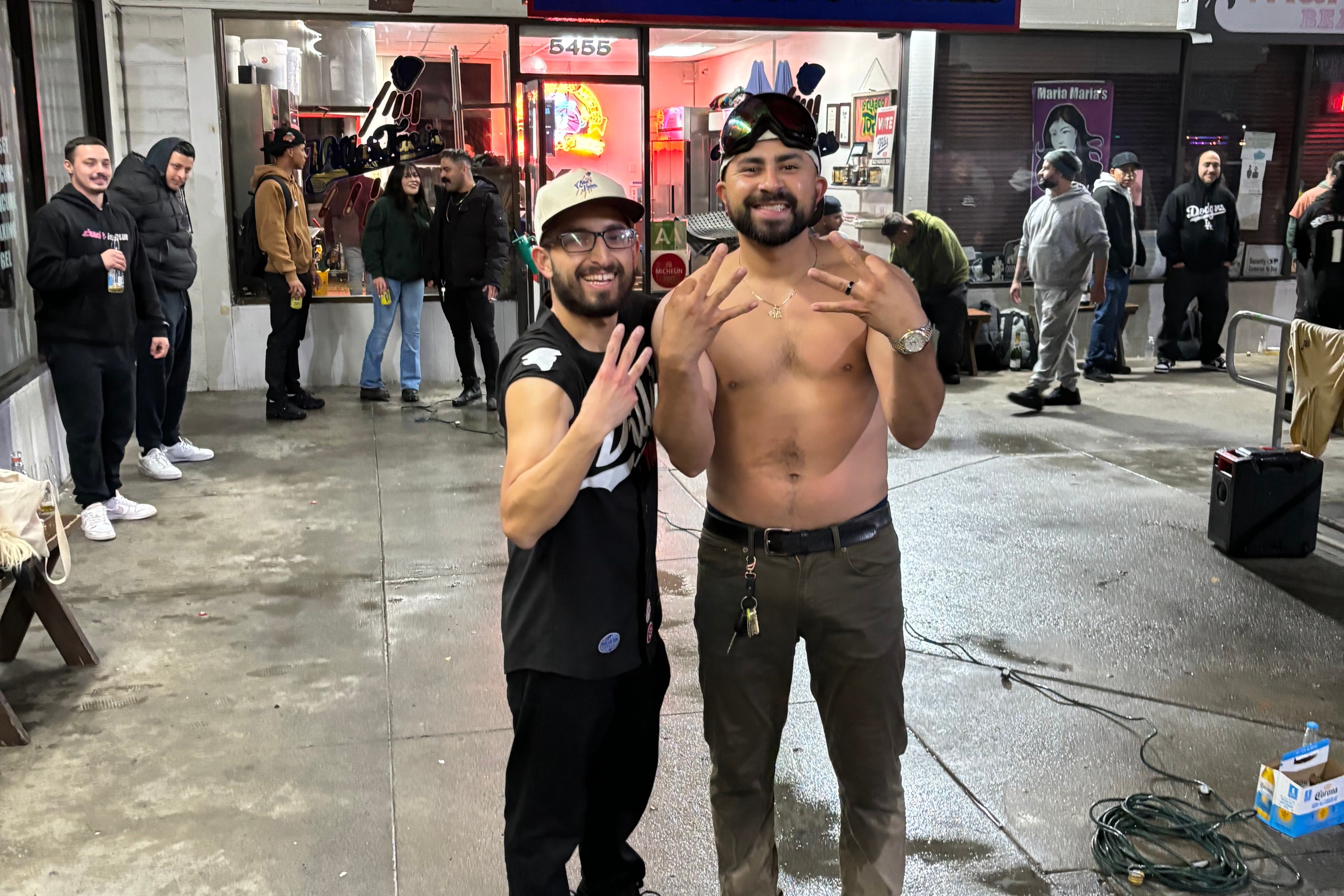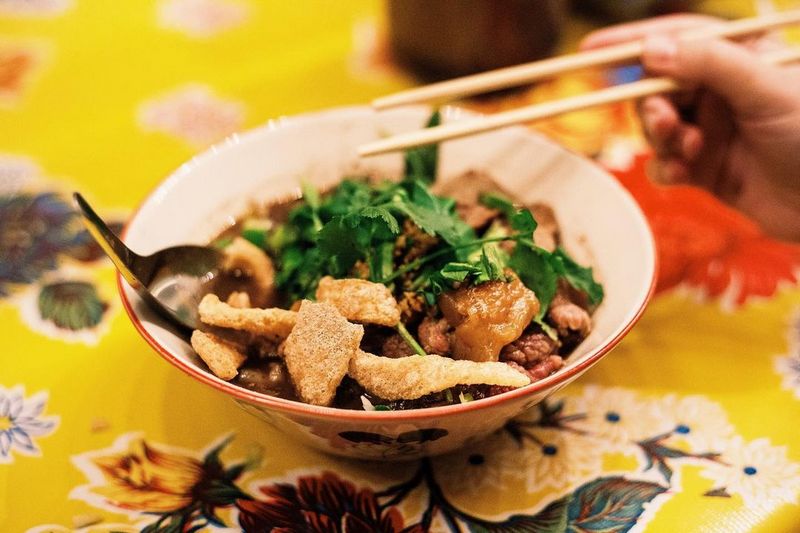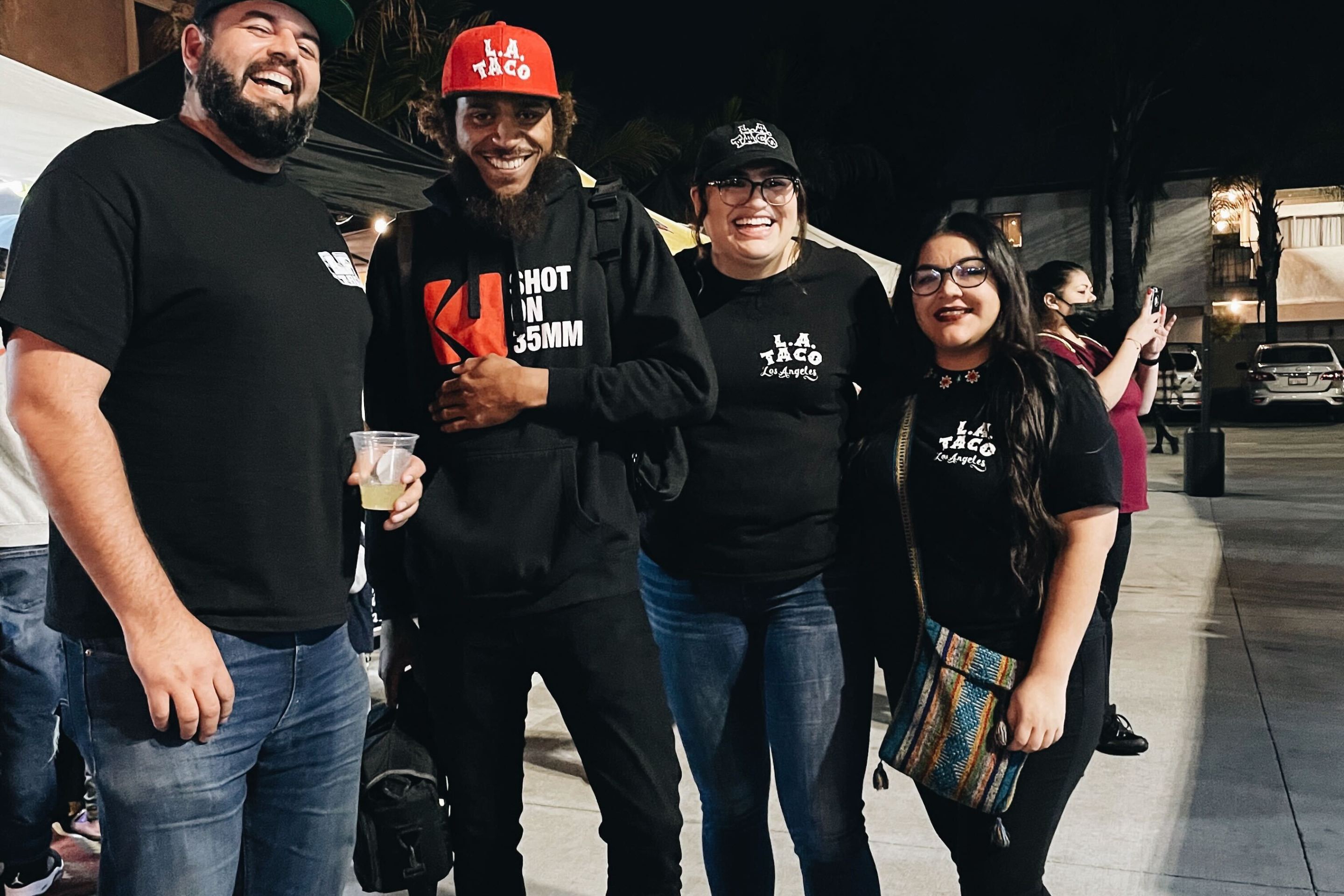How a Vato Went from Working at Death Row Records to Becoming East L.A.’s First ‘Gypsy Brewer’
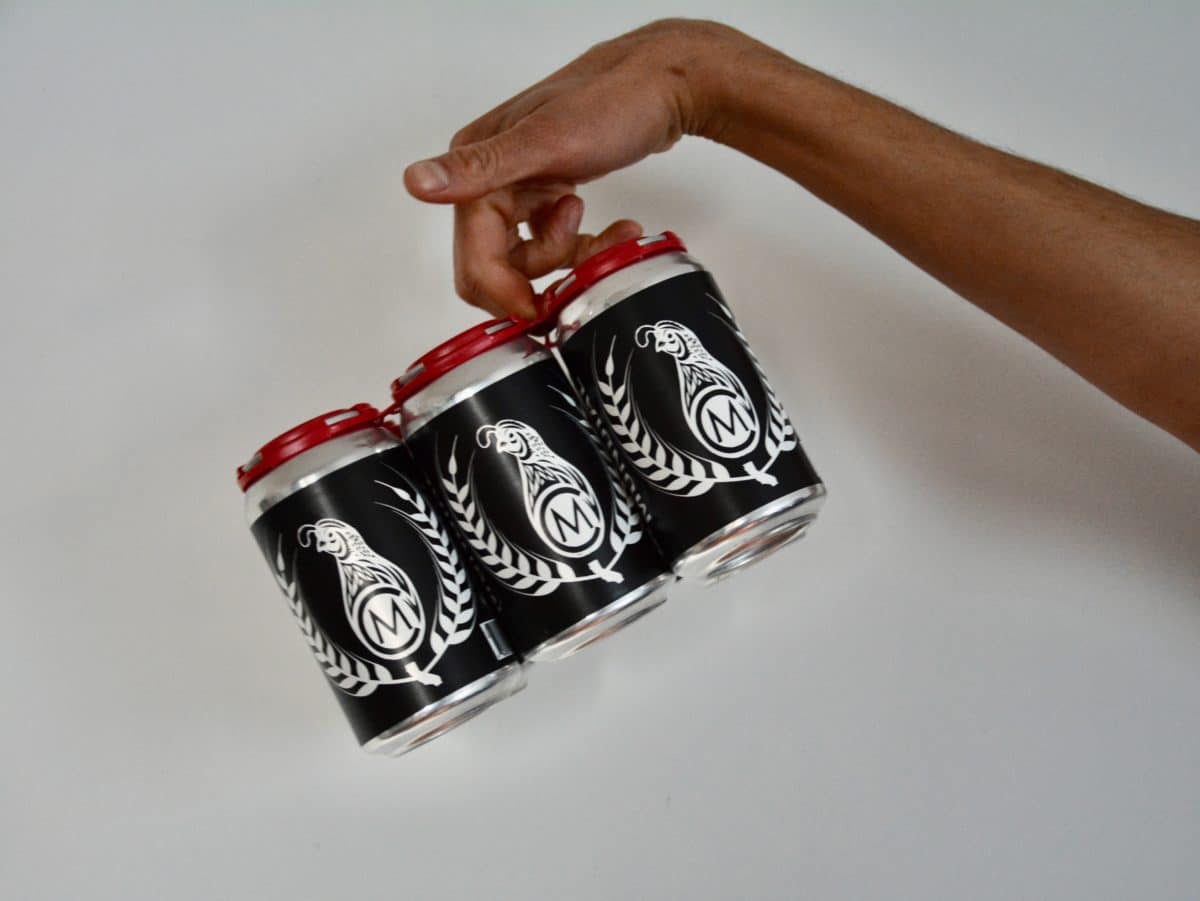
[dropcap size=big]T[/dropcap]o produce a beer in Los Angeles today is a story in itself each and every time.
Julio Trejo wanted something he could hold in his hand.
He had worked the majority of his professional life in the music industry where he had spent time doing P.R., beginning his career as an intern at Interscope that quickly morphed into a stint at Death Row Records before landing at Priority Records. This was during its peak as the hub of west coast hip hip hop, so his clients included Snoop Dogg, Ice Cube, Mack 10, and Westside Connection. Towards the end of his tenure, the music industry that he grew up with lay in shambles with the rise of illegal downloading. He was left looking for something more tangible in his life.
That something was craft brew, specifically starting his own “gypsy brewery.”
L.A.’s craft beer scene had finally begun to bloom and come into its own. Trejo began to consider opening his own brewery but the cost alone was beyond his means which in his research he found anywhere between $750K to million dollars alone. He began to establish his network among L.A.’s burgeoning craft brew scene when he became familiar with the concept known as contract brewing.
In short, contract brewing (or gypsy brewing as its also known) is when beers are made and/or packaged in a brewery that is not owned by the beermakers themselves. However, during this particular time of the early 2010s, contract brewing was still frowned upon. “It was kind of like in hip-hop and using a ghostwriter, you’re not a real MC.” But since then the game has changed and contract brewing has been embraced more by the community.
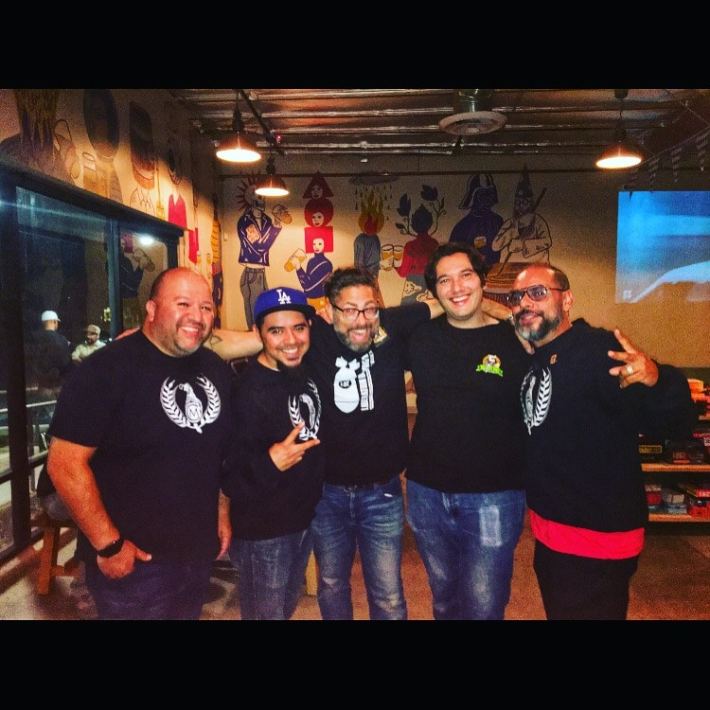
The lauded brewery Mikkeller which now has a bar in Los Angeles is perhaps the most famous and successful gypsy brewer. Founded in 2006, their business model was founded around the idea of not operating an official brewery and instead collaborating with other brewers to create their own recipes using rented machinery. After winning over beer lovers in Mikkeller’s native Copenhagen, the model had yet to take roots here in the United States until much later.
All Roads Lead to Cerveceria Mundial
Trejo founded In the Suds, an L.A. based beer blog covering all things craft brews. His coverage would take him to parts of Northern California such as Russian River and all the way down to San Diego.
While writing and researching for his blog, he stumbled across another budding craft beer scene happening in Tijuana. One of the breweries that stood out in terms of quality was Cerveceria Insurgente and their American Style IPA, La Lupulosa. The Baja beer scene, similar to L.A. was young at the time. Trejo reached out to the brewery owners, brothers Ivan and Damian Morales, about bringing their beer to Los Angeles. The end result would be a distribution deal with Ramirez Liquor in Boyle Heights who acted as the importer to the United States.
“I didn’t want this to be craft beer with a capital “C,'' Trejo recounts. “I want it to be an everyday beer, not a precious beer. This is not a special occasion beer.”
Trejo urged the brothers to push themselves creatively and to incorporate traditional Mexican ingredients such as chocolate, cinnamon, and coffee into their beers. He also advised them to look to Stone Brewing who were beginning to collaborate more and more with small up-and-coming breweries. They said they would look into it and after some time passed they suddenly informed Trejo that they would no longer be able to supply Ramirez. He stopped hearing from them, until one day, he was being contacted by the L.A. Times (by our foo-in-chief no less) about a collaboration with Insurgente and Stone for Xocoveza, which incorporated the same Mexican ingredients and would go on to become a bestseller. While Trejo was left feeling taken advantage of, he decided to go his own way.
It’s a lot harder to produce a beer in Los Angeles than you might think. It's a day to day process that requires a significant amount of navigation to bring each idea to fruition.
Seeking that same inspiration, Trejo would then frequent Whole Foods Market in Pasadena to use as an informal office space. He would take advantage of the store's policy of being able to purchase a beer on the premises to sample and not have to pay an added corkage fees. It was here where he’d research unknown breweries to feature on his blog. It was also through these various exchanges, he befriended the store’s beer buyer Tim McDonald.
McDonald expressed the notion of wanting to brew his own beer one day, which Trejo strongly encouraged him to do so. As luck would have it, Golden Road Brewing (which hadn’t yet been purchased by In-Bev) was hosting a homebrewing contest, Mc Donald entered and ended up winning for his Grapefruit Saison, which went on to be a regional best seller for the brewery. McDonald would go on to Highland Park Brewery to brew the popular Timbo Pils (later to win a gold medal at the Great American Brewing Festival this year in 2019).
“[Contract brewing] a really good spot to be in cause you don’t have to shell out hundreds of thousands of dollars for brewing….you don’t need $500K to contract brew not even close...contract brewing is a great way to get your foot in the door.”
They two began a line of communication through text messaging and Facebook messenger to hone down a few recipes. It was then Trejo’s “virtual beer brand” was born, which he decided to call it Cerveceria Mundial (“Global Brewery” in English) The beer was Quail Pale Ale (or Q.P.A) adorned with the image of California state bird, an approachable pale ale with its balanced bitterness from the centennial hops. After doing more research on the contract brewing process, Trejo partner with San Jose-based company, Hermitage Brewing to produce the Q.P.A.
“I didn’t want this to be craft beer with a capital “C,'' Trejo recounts. “I want it to be an everyday beer, not a precious beer. This is not a special occasion beer.”
The beer was designed to attract both the loyal beer nerd community and as well as the “craft curious.” The flavor profile is meant to be accessible but with enough subtle nuances to attract even the snobbiest of craft beer heads. He reached out to Sara’s Market, a liquor store that had already established themselves as a new craft beer destination in City Terrace. His next stop would be Ramirez Liquor to do the same. After securing his two accounts, he approached Tokyo Fried Chicken and Pizzanista! who both agreed to carry the Q.P.A. As the momentum began to grow, people interest took. Trejo could be seen making regular trips in his '65 Pontiac Bonneville with the trunk filled with cases of his beer. The entire run would sell out.
Life After the First Beer Run
Not wanting to be simply a flash in the pan, he began attracting attention from local Latinx beer homebrew club, SoCal Cerveceros. He was cautious when interacting with them because he wasn’t a homebrewer so he didn’t want to step on toes. The president at the time was Ray Ricky Rivera, who would become Trejo’s partner and VP of Operations. It was only at this time did something occur to Trejo, up until this point, he was used to being the only Latino person in craft beer circles, which was fine by him. But it wasn’t until he began running his own business did he see the importance of mentorship. “You need people who will serve as a sounding board...the future of craft beer lies with new blood.” Diversity has become a central focus in terms of craft beer reach in order to attract the new generation of craft beer drinkers. “You gotta keep growing or you die,” Trejo affirms.
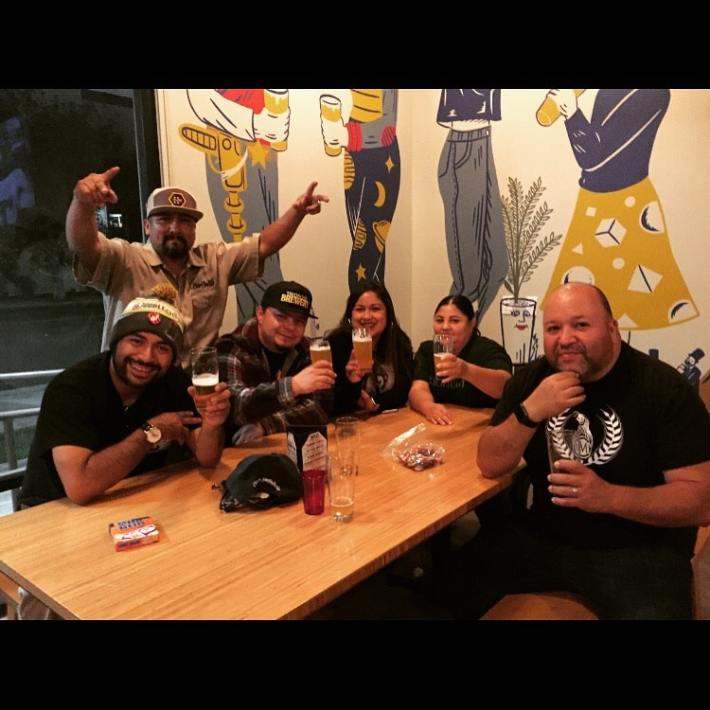
To Rivera, this was the first time operating in contract brewing space but did have friends who were familiar with the process. “Up until that point with Julio, I hadn’t had the chance to get into something.” Rivera goes on further to elaborate the realities the way he sees it in today’s beer market “drinkers don’t care where a brew is brewed, they just care if it’s good.” Rivera sees the cost benefits of the world of contract brewing, “It’s a really good spot to be in cause you don’t have to shell out hundreds of thousands of dollars for brewing….you don’t need $500K to contract brew not even close...contract brewing is a great way to get your foot in the door.”
Being an East L.A. brand he knew he wanted to stay away from the stereotypes that had become commonplace in terms of his marketing. “Cholos, Frida Kahlo, Luchadores...not that I am against but it’s been done and been done very well.” Trejo hoped to do something different.
Up until this point, it had been a solo mission for Trejo with the exception of his wife, Jane who has been integral to the entire process. With the support of the Cerveceros, it was the first time he had found a community of like-minded individuals who provided the support needed to make the venture successful. Through the partnership that formed with Cerveceros, Trejo was no longer the only Latino in craft beer circles. The craft beer industry had finally caught up to him.
Being an East L.A. brand he knew he wanted to stay away from the stereotypes that had become commonplace in terms of his marketing. “Cholos, Frida Kahlo, Luchadores...not that I am against but it’s been done and been done very well.” Trejo hoped to do something different. He wanted to run his company like an independent record label. He wants each beer to have a sound and face. For the Q.P.A. release, he tapped The Delirians who’s brand of music encapsulates different musical styles such as Latin, Jamaican, and Soul. For Trejo, music much like craft beer brings people together in a natural organic way.
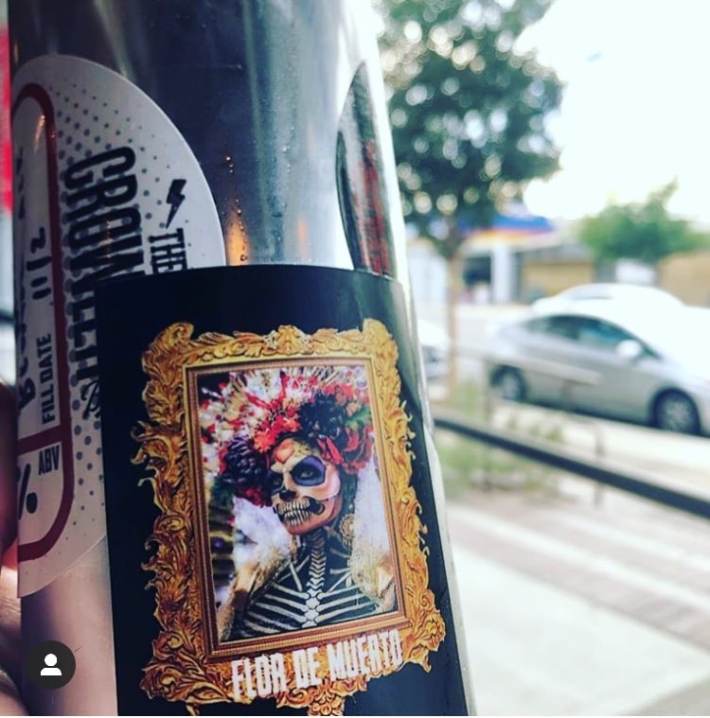
A Beer for the Dead
Fast forward to earlier this year, for his next beer, Trejo was looking for his next collaborator. He tapped the Long Beach-based brewery Liberation Brewery co-owned by former Reel Big Fish trombonist, Dan Regan and Eric McLaughlin, who worked at Alhambra-based Ohana Brewing. There was also the connection between Regan and Trejo, both who had earned their chops in the music industry. The fruits of the relationship ended up being Flor de Muerto, an ambitious tasting blonde ale made with galaxy hops. The name is an ode to marigold flower, which can be seen everywhere around this time of year, whose color and scent are supposed to guide spirits to their family’s respective ofrendas.
This is the world of gypsy brewing, not taking no for an answer and not letting the lack of capital hold you back from attaining your beer-soaked dreams.
The style of beer is described by McLaughin “Something was well-made and easy drinking” On the natural progression of the collaboration Regan remarked, “with a lot of brewers it’s a high-wire act going in, or they are looking to chase a trend and they tend to us the collaboration as something your not culpable for.” That was not the case for his particular collaboration. “This is the type of beer we like to drink.”
The limited-run beer officially launched on Dia de Muertos and sold out in the bars it was featured in.
While it’s been a long run for Trejo throughout all of his ups and downs, he still remains cautiously optimistic about the next step. Rivera and Trejo recently debuted an internet radio show on La Banda Elastica where they will be interviewing musicians and other local luminaries.
However, on the beer-making front, he currently working on another collaboration with another OG indie craft beer pioneer Eagle Rock Brewery to create a brew incorporating jamoncillo, piloncillo, mazapan, and cajeta. Trejo is hoping to use the partnership as a way to get SoCal Cerveceros/SoCal Cerveceras involved as an educational opportunity. He also has another run of the Q.P.A is also on the horizon. For every successful collaboration that comes about there are also the ones that fall by the wayside. Recently Trejo had been in discussion with Barrio Logan based Border X Brewing about collaboration about getting a recipe going but the two companies couldn’t find a middle ground in terms of a recipe so they mutual decision to move on.
It’s a lot harder to produce a beer in Los Angeles than you might think. It's a day to day process that requires a significant amount of navigation to bring each idea to fruition. It's an important aspect to consider the next time you are throwing back a cold one with friends. At the end of the day, Trejo got to hold his own beer in his hand.
In short, this is the world of gypsy brewing, not taking no for an answer and not letting the lack of capital hold you back from attaining your beer-soaked dreams.
Editor’s note: Julio Trejo used to write a beer column for L.A. Taco back in 2014.
Stay in touch
Sign up for our free newsletter
More from L.A. TACO
The 11 Best Backyard Restaurants in Los Angeles
Despite many requests to publish this guide, L.A. TACO has been somewhat protective of these gems to not "burn out the spots." However, we wanted to share it with our small, loyal pool of paid members, as we appreciate your support (and know you to be okay, non-NARCs). Please enjoy responsibly and keep these 'hood secrets...secrets.
Here’s What an L.A. TACO Membership Gets You and Why You Should Support Local Journalism
With more than 30 members-only perks at the best L.A. restaurants, breweries, and dispensaries waiting to be unlocked, the L.A. TACO membership pays for itself!
Announcing the TACO MADNESS 2024 Winner: Our First Ever Three-Time-Champion From Highland Park
Stay tuned for the new date of our TACO MADNESS festival, which was unfortunately postponed this last Saturday due to rain.
What To Eat This Weekend: Cannabis-Infused Boat Noodles, Thai Smashburgers, and “Grass & Ass”
Plus, a pizza festival and a respected chef from Toluca, Mexico comes to Pasadena to consult for a restaurant menu, including enchiladas divorciadas, and more.
Facing ‘Immediate Layoffs,’ L.A. TACO Launches Membership Drive to Save Our Publication
After Sunday, we do not have enough money to make another payroll. We need 5,000 members to become sustainable. Our deadline is April 26th to hit this goal.
